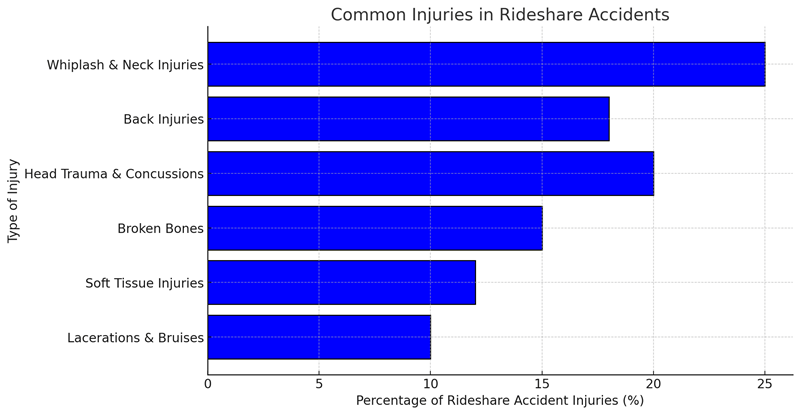Rideshare services like Uber and Lyft have revolutionized transportation in San Antonio. However, the convenience comes with complexities, especially when accidents occur. Determining liability and navigating insurance coverage in rideshare collisions can be more challenging than standard car accident claims. This comprehensive guide will walk you through the essentials—from understanding Texas rideshare insurance laws to the critical steps you should take immediately after an accident.
Understanding Rideshare Accidents: Liability and Coverage
Unique Challenges of Rideshare Accidents
- Multiple Parties Involved: Liability can involve the rideshare driver, the rideshare company, other drivers, or even third parties like vehicle manufacturers.
- App Status Affects Coverage: Insurance coverage varies depending on whether the driver is logged into the app, waiting for a ride, en route to pick up a passenger, or actively transporting one.
- Complex Insurance Policies: Rideshare companies maintain high-limit policies, but these only apply under specific conditions.
How Rideshare Insurance Works in Texas
In Texas, Uber and Lyft provide different coverage levels based on the driver’s status:
- App Off: Only the driver’s personal auto insurance applies.
- App On, Waiting for a Request: Contingent coverage typically includes at least $50,000 per person and $100,000 per accident in bodily injury, plus $25,000 in property damage.
- En Route or Transporting a Passenger: A $1 million liability policy generally applies, along with possible coverage for underinsured/uninsured motorists.
According to a report by the Texas Department of Insurance, understanding which policy applies is vital for securing adequate compensation. If you’re unsure which coverage is in effect, a legal professional can help clarify your situation.
Immediate Steps to Take After a Rideshare Accident
- Call 911 and Seek Medical Attention
- Your health is the top priority. Even if injuries seem minor, consult a medical professional. Documentation of your injuries is crucial for a successful claim.
- Report the Accident
- Notify the police and obtain an official accident report.
- Report the incident to Uber or Lyft through their in-app feature or customer support line.
- Gather Evidence
- Collect contact and insurance information from all involved parties.
- Take photos of the vehicles, road conditions, and any visible injuries.
- If possible, document the rideshare driver’s app status (e.g., screenshot the app if you’re the passenger).
- Avoid Quick Settlements
- Insurance companies may offer a swift settlement, but it often doesn’t account for long-term medical costs or lost wages. Review any offer with an attorney before accepting.
- Contact a Personal Injury Attorney
- Rideshare accidents involve multiple insurers and policies. An experienced attorney can help preserve evidence, handle negotiations, and protect your rights.
For a deeper dive on how to handle post-accident procedures, visit our Filing Insurance Claims page.
Why Hiring a Personal Injury Attorney Is Crucial
Maximizing Compensation
An attorney experienced in rideshare accidents understands the intricacies of multiple insurance policies. They will pursue compensation for:
- Medical Expenses
- Lost Wages
- Pain and Suffering
- Property Damage
- Emotional Distress
For more information on potential recoverable damages, see our Types of Damages page.
Navigating Negotiations and Litigation
- Settlement Negotiations: Insurance companies often attempt to minimize payouts. An attorney can negotiate a fair settlement, as explained in our Settlement Negotiation Process.
- Trial and Litigation: If negotiations fail, your case may proceed to court. A lawyer will guide you through the Trial and Litigation Process, ensuring you meet all legal deadlines and requirements.
Understanding Comparative Negligence
Texas follows a comparative negligence rule, meaning your compensation could be reduced if you’re found partially at fault. An attorney can help minimize or dispute allegations of shared fault, a concept further explored in our Legal Concepts page.
Common Pitfalls in Rideshare Accident Claims—and How to Avoid Them
- Delaying Medical Care
- Insurance adjusters may argue that your injuries aren’t severe if you wait to seek treatment.
- Failing to Document Everything
- Lack of evidence can weaken your claim. Keep track of medical bills, repair estimates, and any communication with insurers.
- Accepting the First Settlement Offer
- Quick settlements usually favor the insurance company, not you. Review all offers with an attorney.
- Not Considering Future Damages
- Serious injuries can have long-term consequences, including ongoing medical treatments or rehabilitation. Factor these into any settlement negotiations.
- Misunderstanding Rideshare Insurance Policies
- Determining which policy applies can be complex. An attorney ensures you file with the correct insurer and maximize coverage.
How Eric Ramos Law, PLLC Can Help
Eric Ramos Law, PLLC is dedicated to representing injured individuals in San Antonio and throughout Texas. Our firm offers:
- Free Consultations: We evaluate your case at no cost and provide clear guidance on your legal options.
- Personalized Legal Strategies: We tailor our approach to the specifics of your accident and injuries.
- Aggressive Representation: Whether negotiating a settlement or fighting in court, we work diligently to secure the compensation you deserve.
Address: 7979 Broadway #207, San Antonio, TX 78209, United States
Phone: (210) 404-4878
Ready to Pursue Your Claim?
If you’ve been injured in an Uber or Lyft accident, don’t navigate the legal complexities alone. Contact Eric Ramos Law, today for a free consultation. We’ll help you understand your rights, guide you through the insurance maze, and work tirelessly to achieve the best possible outcome for your case.
